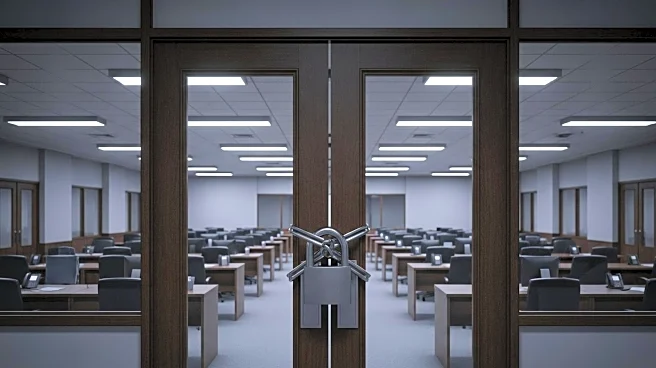What is the story about?
What's Happening?
The U.S. government shutdown commenced on Wednesday, affecting hundreds of thousands of federal workers. Approximately 750,000 federal employees are expected to be furloughed daily, according to the Congressional Budget Office. Essential staff, including air traffic controllers and border patrol agents, are required to continue working without pay until funding resumes. The shutdown was triggered after the Senate failed to pass a short-term funding bill, which would have kept the government operational through November 20. The bill fell short in a 55-45 vote, failing to reach the necessary 60 votes. Senate Minority Leader Chuck Schumer and other Democrats opposed the bill, advocating for an extension of Affordable Care Act subsidies and the reversal of Medicaid cuts included in President Trump's One Big Beautiful Bill.
Why It's Important?
The shutdown has significant implications for federal workers and government operations. While federal employees are guaranteed back pay once the shutdown ends, contractors are not, leading to financial uncertainty for many. The shutdown disrupts essential services and places a strain on workers who must continue their duties without compensation. The political standoff highlights ongoing tensions between the Senate and the administration, particularly regarding healthcare funding and budget priorities. The situation underscores the challenges in reaching bipartisan agreements on critical fiscal matters, affecting public policy and economic stability.
What's Next?
The Office of Management and Budget has directed federal agencies to prepare layoff plans for programs not aligned with the president's priorities if funding lapses. Labor unions have initiated legal action, arguing that the move violates federal law. The shutdown's resolution depends on negotiations between lawmakers and the administration, with potential impacts on public services and employee morale. Stakeholders, including political leaders and civil society groups, are likely to continue advocating for a resolution that addresses the concerns of affected workers and maintains essential government functions.
Beyond the Headlines
The shutdown raises ethical and legal questions about the treatment of federal workers and the prioritization of government programs. The potential for permanent job cuts and the legal challenges from labor unions highlight the broader implications for workers' rights and government accountability. The situation may lead to long-term shifts in public policy and political dynamics, influencing future budget negotiations and legislative priorities.

















